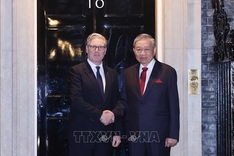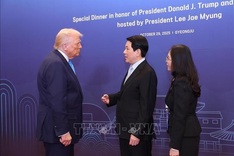As the convergence of artificial intelligence (AI) and 5G technology reshapes global economies, Vietnam is emerging as a country with strong digital ambitions, though experts warn that strategic investments, particularly in 5G infrastructure, remain essential for long-term competitiveness.
A recent report by the Lee Kuan Yew School of Public Policy (LKYSPP) at the National University of Singapore, led by Vietnamese professor Vu Minh Khuong, outlines how Southeast Asia can capitalise on 5G-AI integration to drive transformative economic growth.
Titled 'Harnessing 5G to accelerate AI-driven transformation in ASEAN', the report released on Tuesday calls for decisive policy action, especially in infrastructure, to ensure the region does not miss a once-in-a-generation opportunity.
According to the report, Vietnam has adopted a 'smart follower' strategy, avoiding the high costs of pioneering technologies while leveraging established standards, infrastructure savings and global lessons. This approach has allowed the country to deploy 5G in a more focused and cost-efficient way, particularly in priority areas such as high-tech parks, ports, and industrial zones.
Vietnam’s geopolitical neutrality has also positioned it well to attract global investment into strategic sectors, including semiconductor manufacturing, telecom infrastructure and AI innovation.
By concentrating investments in high-impact applications, from smart manufacturing and precision logistics to remote healthcare, Vietnam is aligning 5G and AI to generate real economic value for businesses and society. The country is not merely pursuing faster connectivity, but rather targeting strategic use cases where the two technologies converge to deliver productivity and innovation.
However, Professor Khuong noted that while Vietnam has made visible progress in AI deployment, the level of commitment from local telecom operators toward 5G remains insufficient.
“I have yet to see a clear strategy from telecom operators. They recognise the economic potential of 5G, but their level of investment is still lacking. This could delay the rollout,” he said.
“The Government should take a more active role, similar to Singapore’s approach, by connecting stakeholders, including international tech providers, domestic enterprises, end users and funding bodies.”
He stressed the importance of creating specific use-case scenarios to catalyse collaboration and ensure 5G infrastructure supports scalable AI deployment.
Becky Fraser, Vice President of Global Government Affairs at Qualcomm, echoed this view, highlighting that 5G’s low latency and high bandwidth provide an ideal foundation for edge computing. This allows AI inference to take place directly on devices or local servers, eliminating the need to transmit data to the cloud, improving response times, security and operational efficiency.
“5G does not just support AI. It unleashes its full potential,” Fraser said, adding that the two technologies operate best as complementary forces.
“Together, they are opening up a new era of smart connectivity that will reshape industries across the board.”
Laying the groundwork for 6G
The LKYSPP report also points to the importance of private 5G networks in accelerating Industry 4.0, while fixed wireless access (FWA) is seen as a key solution to bridging digital divides in remote areas.
Significantly, current 5G deployments will serve as a foundation for 6G by 2030, making today’s strategic decisions critical for future competitiveness. The report warns that ASEAN’s real race is not about deploying 5G or 6G first, but about maximising the value these technologies can deliver.
The report envisions an ASEAN where AI-powered smart manufacturing goes global, precision agriculture boosts rural productivity, and immersive education reaches even the most remote students. But realising this vision, it says, will require coordinated policies, clear strategies and robust ecosystem collaboration.
As Vietnam continues its digital journey, experts agree that unlocking the true economic value of 5G and AI will require not just ambition – but accelerated investment and strategic alignment across sectors.




















